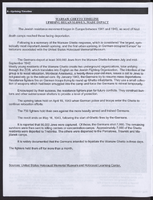Search the Special Collections and Archives Portal
Search Results
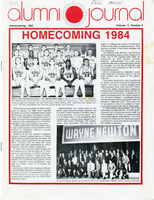
UNLV Alumni Journal, Volume 11, Number 5
Date
Archival Collection
Description
Volume 11, number 5 edition of the University of Nevada, Las Vegas "The Alumni Journal."
Mixed Content
Katherine A. Spilde Papers on Native American Gaming
Identifier
Abstract
The Katherine A. Spilde Papers on Native American Gaming include materials collected by anthropologist Katherine Spilde about Native American gaming and the greater gaming industry. The materials date from 1789 to 2015, with the bulk of materials dating from 1995 to 2010. Materials dating from the eighteenth and nineteenth centuries are reproductions of key court opinions and treaties concerning Native American rights and sovereignty. The majority of the materials document Native American gaming following the passage of the 1988 Indian Gaming Regulatory Act (IGRA). The papers detail Native American gaming enterprises both on and off reservations, the socioeconomic impact of gaming, and the legislative history of Native American gaming in the United States. The papers include research and subject files created by Dr. Spilde during her employment with the National Gambling Impact Study Commission (NGISC), the National Indian Gaming Association (NIGA), and the Harvard Project on American Indian Economic Development (HPAIED). The collection includes socioeconomic reports; testimonies; correspondence; memos; press releases; photographs; audiovisual materials; promotional materials from casinos and tourist attractions; brochures; fact sheets; summaries; booklets; pamphlets; advertisements; tourism materials; journal articles; legal briefs; legislative documents; court opinions; Dr. Spilde’s notes; presentations; packets, agenda, schedules, and itineraries from conferences; periodicals; Native American and community newspapers; and newspaper articles. The collection includes materials about over one hundred federally recognized Native American nations. Also included are materials that document the socioeconomic impact of gaming, the international gaming industry, criminal activities related to gaming, advertising about gaming and casinos, lotteries, internet gaming, compulsive gambling, and bankruptcy as a result of gambling.
Archival Collection
Kirsten Searer (Nevada Public Education Foundation) oral history interview conducted by Magdalena Martinez and Taylor Cummings: transcript
Date
Archival Collection
Description
From the Lincy Institute "Perspectives from the COVID-19 Pandemic" Oral History Project (MS-01178) -- Education sector interviews file.
Text

Cristina Alano oral history interview: transcript
Date
Archival Collection
Description
Oral history interview with Cristina Alano conducted by Cecilia Winchell and Stefani Evans on September 9, 2022 for the Reflections: The Las Vegas Asian American and Pacific Islander Oral History Project. In this interview, Alano recalls a happy childhood in Pampanga, Philippines. After attending college for a banking and finance degree, she briefly worked at a bank before marrying her husband and immigrating to the United States. She would go on to move to Colorado where she lived for seven years, and finally moving to Las Vegas, Nevada in 2003. Alano recalls her first jobs in Las Vegas, including Walmart, SEI Electronics, a cashier at the Riviera, and finally the airport where works as a supervisor at Hudson as well as an assistant manager at Brighton. She discusses what she has done at each job and how she ended up getting involved with the Culinary Union in 2016. Since joining the union, she has done everything from being a shop steward to canvassing, most recently flying down to Georgia to help campaign for Senator Warnock. Throughout the rest of the interview, she discusses everything from food, to festivals, and her family.
Text
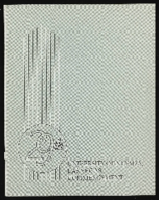
University of Nevada, Las Vegas (UNLV) 29th commencement program
Date
Archival Collection
Description
Commencement program from University of Nevada, Las Vegas Commencement Programs and Graduation Lists (UA-00115).
Text
MacDonald Ranch Development Records
Identifier
Abstract
The MacDonald Ranch Development Records (1972-2010) contain correspondence, maps, land assessments and investigations, master plans, and architectural, civil engineering, and landscape drawings primarily detailing the community development process of MacDonald Ranch, a master-planned community in southwest Henderson, Nevada.
Archival Collection

Kimberly and William King oral history interview: transcript
Date
Archival Collection
Description
Oral history interview with Kimberly and William King conducted by Claytee D. White on November 27, 2017 for the Remembering 1 October Oral History Project. In this interview, Kimberly and William King discuss the October 2017 mass shooting in Las Vegas, Nevada and their experiences from that day. They talk about attending the Route 91 Harvest festival and their struggle to find safety and obtain medical medical attention for William after he was shot. Kimberly describes her feelings regarding the city prior to the shooting and how her perspective on Las Vegas has changed. The couple finish the interview with a discussion of life after the shooting, especially in regards to love and community.
Text
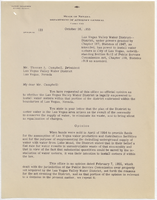
Letter including Nevada Attorney General Opinion No. 123 from Harvey Dickerson to Thomas A. Campbell (Las Vegas), October 26, 1955
Date
Archival Collection
Description
Notwithstanding Section 6112 of the Public Service Commission Act, the Las Vegas Valley Water District was allowed to meter water to customers; Opinion No. 123.
Text
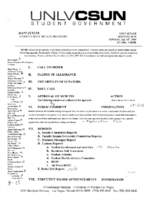
Meeting minutes for Consolidated Student Senate, University of Nevada, Las Vegas, July 14, 2008
Date
Archival Collection
Description
Text

